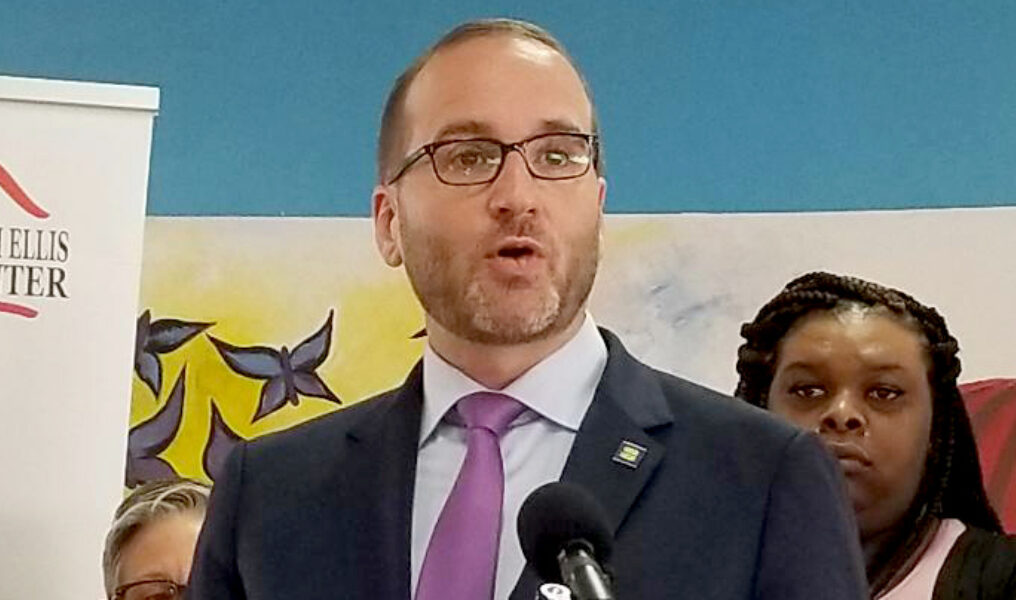The Human Rights Campaign released the results of their 2018 National Survey of LGBTQ Teens at a special press conference that took place at the Ruth Ellis Center in Highland Park on May 16. HRC President Chad Griffin attended the conference along with Ellen Kahn, director of HRC's Children, Youth and Families Program.
Kahn called the survey "a critical document" that, "Tells us a reality faced by many LGBTQ youth in our schools and communities, in our families and in our neighborhoods. Every day my team and I work to improve the lives of LGBTQ youth and the results of this survey will inform our work going forward because to fully address the needs of LGBTQ youth we need to have a clearer picture of what they're going through."
That picture is at times bleak. Among other statistics, the survey showed that 77 percent of respondents reported feeling depressed while 95 percent said they had trouble sleeping at night. A mere 26 percent said they always felt safe in their classrooms and 43 percent said they had been bullied at school in the past 12 months. Half of the trans and gender non-conforming respondents said they can never use the restroom that aligns with their gender identity at school and 65 percent said they tried to avoid using the restroom all day while at school.
"This youth survey is the largest and most comprehensive of our young people across the country today," said Griffin. "The survey is inclusive of more than 12,000 LGBT youth participants."
Of that number, more than 600 were from Michigan. All respondents were between the ages of 13 and 17. Respondents came, "From every corner of America from small towns to big cities," Griffin said. "They told us they're not only experiencing heartbreaking levels of stress, anxiety and rejection, but alarming numbers feel overwhelmingly unsafe in their own classrooms … These are not just statistics. These are not just assigned numbers next to results. Each of these numbers represents real people, a real person, their actual stories, their own lived experience."
Griffin said that HRC was adamant that the survey included a large cross section of the community.
"We were very intentional in our outreach in this survey to ensure that we had strong representation from LGBTQ youth of all backgrounds, including young people of color who are often underrepresented in national surveys," he said.
If the survey was for the youth, Griffin said it revealed the sins of adults.
"These statistics show the devastating toll that rejection by family and peers, bullying and harassment and apathy on the part of too many adults is having on our young people.
"I think this is one of the critical points to underscore," Griffin continued. "These statistics are driven by the action and inaction of adults. Those who are to be the responsible ones protecting our young people, protecting our youth from the bullies and in so many instances this shows those who should be responsible adults are in fact acting as the bullies. It's unacceptable and it has to change. These statistics must serve as a call to action for this nation."
Griffin said HRC chose Detroit and the REC as the location to unveil the report because of the, "Lifesaving work that [REC does] day in and day out. You are on the front lines of these battles and you're critical."
Kahn echoed the sentiment.
"We are delighted to be at the Ruth Ellis Center in Detroit, a community based organization that works every day to improve the life of LGBTQ teens," Kahn said. "The Ruth Ellis Center stands out as a national model for putting care intro action."
REC Executive Director Jerry Peterson said the Center was "incredibly delighted" to host the press conference and other events throughout the day celebrating the release of the survey.
"We serve an incredibly fierce, wonderful, creative number of young LGBT folks in the Detroit area who struggle to build positive futures," said Peterson. "So our core purpose as an organization is to work with LGBT young people who are experiencing barriers, both systemic and interpersonal barriers, to their housing, health and wellness."
At the close of his remarks, Griffin stated that if the survey seemed distressing, "There is also reason for great hope. As this report makes clear there are stories of empowerment and resilience, activism and advocacy by our youth. Across the country LGBTQ youth are taking a stand and they are advocating for inclusivity and equality in their homes, their schools and their communities."
Read the full report online at https://hrc.org/resources/2018-lgbtq-youth-report
HRC Releases Findings of 2018 National Survey of LGBTQ Teens











